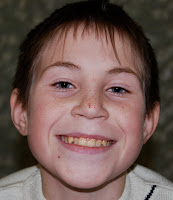
While much of the Christian world is commemorating the birth of a baby adopted by His earthly father 2,000 years ago, the Orthodox Church celebrates Christmas January 7. For most Russians, today is like any other, but for a nine-year-old boy from a forsaken hamlet, this December 25 will be one to treasure always.
An orphan most of his life, two years ago, Yuri, then seven, looked out his orphanage window and recognized a family he had met on a Lighthouse Project trip to Wisconsin. Elated they had come for him, he bounded from the building, leaped into their arms―and found they were there for another child. Devastated by his despondency, our entire program intensified efforts to find his family. Subsequently, he was scheduled for three different trips, though illness always precluded his travel. When an orphanage director’s fiat later prohibited Yuri, an insulin-dependent diabetic, from traveling again, advocating for him became more rigorous, since any family would now need to visit him in the motherland, rather than the States. After impassioned conversations with scores of families, one finally promised to adopt him, but abandoned the process after several months.
One year later, in desperation, I wrote about Yuri in this forum (Waiting Heart, Wrong Arms, 5/8/09). In June, Aaron and Robyn, adopting a child from my January 2009 Tulsa trip, read the post. In faith, recognizing him as their son, they visited him in Russia. On their first morning together, an awakening Yuri opened his eyes cautiously, fearing he had sabotaged a magnificent dream. But seeing Robyn’s smile, he beamed, chirped “Mama!” and stretched out his arms for a hug.
It was real. He had a family.
It was real. He had a family.
While Yuri had waited much longer, my role as matchmaker was two years coming, and wholly satisfying. A much-loved aunt, to whom my mom donated a kidney, is a lifelong diabetic, so I felt a deep connection though I had never met him. In October, when I visited his orphanage, Yuri was the child I most hoped to see; while I am not especially maudlin, I brushed away tears as Faith introduced me as a friend of his family-to-be. Gifted a shy smile by this boy we’d hoped to help forever, it was my most gratifying Lighthouse moment.
Celebrating the birth of another adoptee this day, our presents recall that first Christmas when the greatest gift was given. Early this morning, half a world away, another gift was lovingly bestowed and joyously accepted, mirroring God’s own compassion. While we were still sleeping, Aaron and Robyn became Yuri’s parents in a Russian courtroom. His wait over, his leap into the wrong arms history, his life in a family just beginning, a world of promise awaits this one small child.
Yuri, it’s real. You have a family. Merry Christmas!
Tweet









